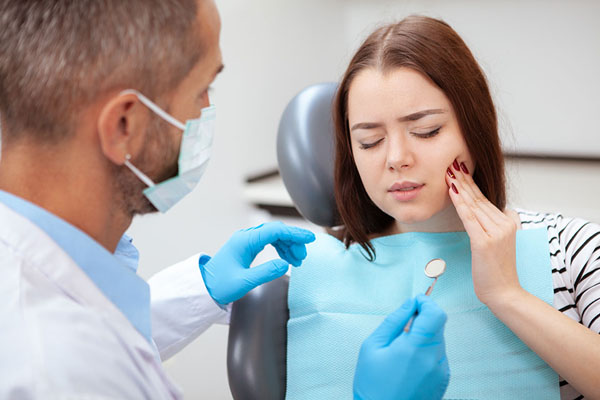The Link Between TMJ and Sleep Disorders
Temporomandibular joint disorders (TMD) and sleep apnea are two conditions that can impact your overall health and well-being. While they may seem unrelated, recent research has found a significant link between temporomandibular joint disorder and sleep apnea.
Explore this connection and discuss the potential impact on your health. To seek treatment, contact our dentist in Sacramento by calling (916) 929-9222 today.
What Is Sleep Apnea?
Sleep apnea is a sleep disorder that causes interruptions in breathing during sleep. There are two main types of sleep apnea:
- Obstructive sleep apnea is the most common type and occurs when the muscles in the back of your throat fail to keep your airway open, despite efforts to breathe. As a result, the oxygen level in your blood drops, and your brain is briefly aroused from sleep to signal the muscles to tighten and open the airway.
- Central sleep apnea is less common and occurs when the brain fails to signal the muscles to breathe, resulting in a temporary lapse of breathing during sleep. Unlike OSA, there’s no physical obstruction in the airway.
The Connection Between TMJ and Sleep Apnea
Recent studies have suggested that there may be a link between TMJ and sleep apnea. One study found that nearly 40 percent of patients with TMD also had sleep apnea.
TMJ disorder can cause pain and discomfort in the jaw, neck, and shoulders, making it difficult to fall and stay asleep. It can also lead to muscle tension and spasms in the upper body, including the muscles that control breathing. This can make it harder to breathe normally during sleep, leading to snoring, gasping, or choking.
On the other hand, sleep apnea can also contribute to the development of TMD. This is because sleep apnea can cause repeated teeth grinding and clenching, which can strain the TMJ and lead to painful symptoms.
Signs of TMJ Disorders Caused by Sleep Apnea
Signs that TMD may be caused by sleep apnea include:
- Jaw Pain: Sleep apnea can cause teeth grinding and clenching during sleep, which can put excessive strain on the TMJ and lead to symptoms such as jaw pain.
- Headaches: Sleep disorders can cause headaches due to the lack of oxygen in the body during sleep. These headaches may be felt in the temples or behind the eyes.
- Neck and Shoulder Pain: Muscle tension and spasms in the upper body can occur, including the muscles that control breathing. This can lead to neck and shoulder pain, which can contribute to TMJ symptoms.
- Limited Jaw Movement: You may experience pain and discomfort in the jaw, neck, and shoulders, making it difficult to move the jaw properly. This can lead to limited jaw movement.
- Ear Pain: Sleep disorders can cause pressure changes in the ear, which can lead to ear pain. Discomfort may be felt in the ear itself, or the TMJ area.
Treatment for TMJ and Sleep Disorders
For TMD, treatment may include physical therapy, medications, or oral appliances such as splints or mouth guards.
For sleep apnea, treatment may include:
- Continuous positive airway pressure (CPAP) therapy involves wearing a mask over the nose or mouth. It delivers a stream of air to keep the airway open during sleep.
- Bi-level positive airway pressure (BiPAP) therapy delivers air at different pressures during inhalation and exhalation.
- Oral appliances are custom-made devices that are worn in the mouth to help keep the airway open during sleep.
- Surgery in some cases, such as tonsillectomy or adenoidectomy, removes obstructive tissue in the airway.
For some, treating one condition may also help alleviate the symptoms of the other. For example, treating sleep apnea with a CPAP machine may help reduce teeth grinding and clenching, which can help alleviate TMJ disorder symptoms.
Frequently Asked Questions
Who should I see if I suspect I have TMD or sleep apnea?
If you suspect you have TMD or sleep apnea, schedule an appointment with your dentist or doctor. They can perform an examination and refer you to a sleep specialist or an oral and maxillofacial surgeon. The doctor you’re referred to will depend on your TMD symptoms.
Will treating sleep apnea help with TMD?
There’s some evidence to suggest that treating sleep apnea can help alleviate symptoms of TMD. When sleep apnea is treated with a continuous positive airway pressure (CPAP) machine or other methods, it can reduce the tension and strain on the jaw joint during sleep. This can improve TMD symptoms, such as pain and difficulty opening the mouth.
What is the best sleeping position for TMD?
For individuals with TMD, sleeping on their back with a small pillow or rolled towel under the neck for support is recommended. Sleeping on the stomach should be avoided as it can put unnecessary strain on the neck and jaw. Consult a sleep specialist for more tips on managing TMD and sleep apnea.
Improve Your Sleep and Jaw Pain With Personalized Care
If you’re experiencing symptoms of TMJ or sleep apnea, seek medical attention from our Sacramento dentist. Dr. Scott Grivas can properly diagnose your condition and recommend the best treatment for your needs. Don’t hesitate to speak up and seek help — these conditions can significantly impact your quality of life and overall health.
Take control of your health and schedule a consultation today by calling (916) 929-9222.


